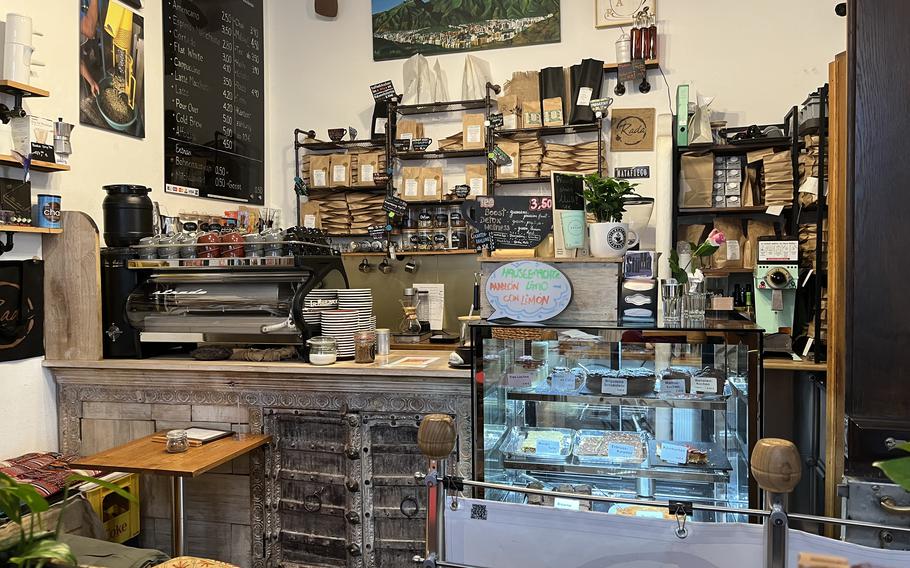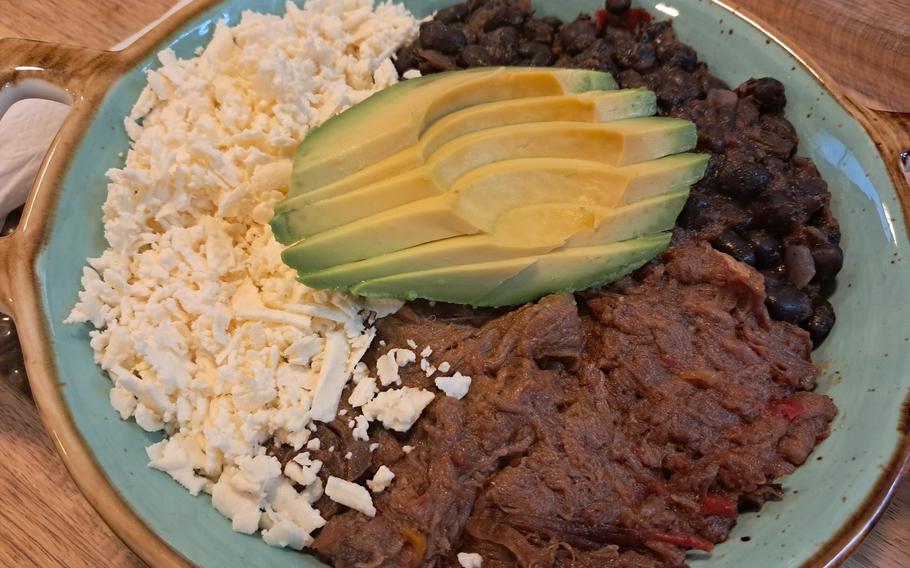
The cafe portion of Rada Arepa in Heidelberg, Germany, is dedicated to coffee, tea and baked goodies. Bills for cafe orders and restaurant orders are paid in separate places. (David Edwards/Stars and Stripes)
When I pine for gluten-free Venezuelan food, my thoughts now gravitate toward the cobblestone streets and old-world charm of Heidelberg, Germany.
This isn’t as strange as it sounds, judging by the brisk business I’ve seen at Rada Arepa. My first visit to the restaurant was also my introduction to the namesake food.
The arepa is a cornmeal cake with pre-Columbian origins that is stuffed with various savory ingredients. They’re beloved as a staple snack or meal in Venezuela and Colombia, each of which has different preparations and traditions for them.
Rada Arepa is divided into a cafe and an adjoining restaurant. The small floor plan makes for tight quarters in both, and the combined number of tables is about 10.
There are other items for sale, including empanadas and some fuller meals that I’d try on a later visit. But for my baptism into Venezuelan cuisine, I went with the main attraction.
The smattering of arepa options included traditional versions with distinctive flourishes, such as the catirita, with braised chicken, gouda cheese, avocado and marinated salad. A falafel-inspired arepa was among the vegetarian and vegan fare.
I went with the arepa domino, which is filled with black beans, rice, beef and fried plantains. On the plus side, the dish was so rich that I couldn’t finish it.
But that also was due to my regret about including the sweet plantains. I tried them once long ago and it turns out I still don’t like them. In addition, I drank a bottle of blackcurrant juice a little too quickly and ran out of beverage with about a third of the arepa still on my plate.
Redemption in the form of dessert was just across the way from my cafe table, where I had been eying all the items in the display case. A slice of chocolatey torte with peanuts and caramel stood out as the most tempting.
Saying adios to Rada on such a sweet note primed me for a second trip, this time with my brother, who had stopped to visit me before heading to Italy.
He turned out to be the ideal companion for this eatery. Unbeknownst to me, he had dated a Venezuelan woman in college and learned a thing or two about the country’s staple dish.
For him, our lunch on a drizzly Tuesday started with a French press coffee followed by an arepa pelua, which contained shredded beef, gouda cheese and jalapenos.
Both items made a favorable impression. The coffee was strong but satisfying, with hints of fruit. He described the arepa as “assertive without being pushy.”
The fire from the jalapenos paired well with the savory meat, and the arepa was lighter and crispier than the ones from his college days.
He topped off the meal with a shot of espresso, which was smooth yet bold, leaving him happy with his experience.

Pabellon criollo is the national dish of Venezuela. It normally has fried plantains to match the yellow in the Venezuelan flag. The order pictured here has avocado, cheese, black beans and shredded beef with minced red peppers, but no plantains at the customer's request. (David Edwards/Stars and Stripes)
I settled on pabellon criollo, the national dish of Venezuela. I skipped the plantains this time and enjoyed the filling combo of rice, black beans, shredded beef and flecks of chili.
This time, I had a little bit of orange-mango-passion fruit juice left in the bottle when I finished my meal. For dessert, I had a basic brownie and a vanilla chai latte, both of which were splendid.
The drink was made with David Rio chai powder, a brand that I knew from many a tea-filled morning at home. Rada also had another flavor of the chai powder, so I’ll try to find that one during my next grocery run.
Rada owners Raphael Pulgar Schwartz, Daisy Schwartz and Joel Urbaez have been operating their business on Untere Strasse since 2016. The restaurant used to be known as Arepas World and still appears that way on Google Maps,
The current moniker is a mashup of the first two letters in Raphael and Daisy.
In the early days, the establishment covered a mere 172 square feet, making it “probably the smallest coffee roastery in the region,” according to the menu. The growth of the business allowed the family to add the restaurant.
Its coffee beans are sourced mainly from Central and South America. In the restaurant, a pair of Venezuelan flags augment the culinary efforts to create the ambience of the home country.
The path to Rada on my first visit took me past another gluten-free restaurant called Cafe Ly, which I intend to try the next time I make tracks to Heidelberg. Nonetheless, the tres leches in the cafe and the empanadas in the restaurant are exerting a pull on me even now, not to mention another arepa.
Rada Arepa
Address: Untere Strasse 21, Heidelberg, Germany
Hours: Sunday through Thursday, 12-6 p.m.; Friday and Saturday, 12-8 p.m.
Cost: Empanadas, 4 euros; arepas, 9 to 13 euros; bowls, 12.50 to 13.50 euros; pabellon criollo, 15 euros
Info: 06221 1805585, www.kaffeeroestereiheidelberg-rada.com/